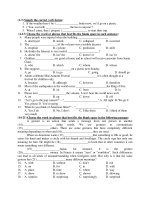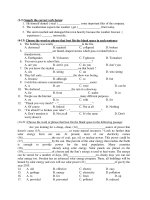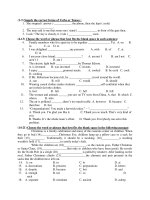THI VÀO LỚP 10 TIẾNG ANH (ĐỀ 9)
Bạn đang xem bản rút gọn của tài liệu. Xem và tải ngay bản đầy đủ của tài liệu tại đây (49.86 KB, 2 trang )
I. Circle the word that has the underlined part pronounced differently from the others in each line.
1. A. but B. cut C. sun D. put
2. A. skill B. fine C. dinner D. since
3. A. easy B. seat C. learn D. eat
4. A. close B. pop C. cold D. rose
5. A. lake B. plane C. plan D. state
6. A. here B. mere C. there D. sphere
7. A. said B. laid C. maid D. aid
8. A. pity B. tiny C. hidden D. forbid
9. A. education B. editor C. detective D. wonderful
10. A. book B. floor C. look D. hook
II. Circle the best answer.
1. The teacher wants every student to listen _____.(careful / carefully / careless / care)
2. He is sick ____he stayed up late watching soccer.(so / but / because / although)
3. ____ is a person who installs and repairs water pipes.(goldsmith / carpenter / A silversmith / A plumber)
4. If there is too much exhaust fume in the air, more and more people ____ with respiratory problems.(will cope / would cope / cope / coped)
5. He suggested ____ a show to raise money.(to organize / organizing / to organizing / organize)
6. Today I m going to tell you how to reduce the air ____.(pollution / pollute / polluted / pollutant)’
7. It s raining, ____ I can t go to the beach.(and / however / but / so)’ ’
8. I suggest that you ____ English in class.(should speak / shouldn t speak / speaking / to speak)’
9. Hanh can t go to the movies with us tonight. She will have to ____ her little sister’ .(look through / look at / look after / look up)
10. You have never been to Nha Trang, ____?(have you / haven t you / you have / you haven t)’ ’
11. I broke the cup ___ I was careless.(because / therefore / although / if)
12. I m pleased ___ you are working hard.(who / but / that / what)’
13. It s raining, ___ We can t go to the seaside.(but / although / therefore / so)’ ’
14. Mrs. Yen forgot to ___ the faucet when she left for work.(turn off / look for / go on / open)
15. Auld Lang Syne is a song ___ is sung on New Year s Eve.(who / whom / which / when)’
16. Many tourists enjoy festivals in Vietnam ___ they don t understand Vietnamese culture very much.(even / though even / if / although)’
17. All my friends are at the cinema now. I wish ___ with them.(am / were / has been / would be)
18. You watch TV programs every day, ___?(do you / don t you / you do / you don t)’ ’
19. Vietnamese women today prefer to wear modern clothing at work because it is more ___.(convenience / inconvenience /
convenient / inconvenient)
20. She always takes good care ___ her children.(for / in / of / with)
III. Fill each numbered blank with one suitable word to complete the passage.
Nowadays, more and more people are changing the way they use their televisions. Some years ago we (1)________ to
turn on TV and watch whatever there was. But now we choose the programs we watch (2) ________ more carefully because
we have many (3) ________ interesting things to do. One result of this change is that we are also becoming (4) ________
careful about the actual television set itself. As we watch fewer programs, we want to be sure that we will (5) ________ a really
good picture, with bright color and clear sound. Because it will be switched off (6) ________ of the time, we also want the
television to look good when we are not watching it. So when we (7) ________ or rent we look at the outside to make sure it is
attractive and will look right (8) ________ other furniture. Of course, we have to pay more (9) ________ high quality. However,
it seems that the number of people (10) ________ are content to do so is increasing and this should have a good result,
because in the end all televisions will have better quality.
IV. Rewrite each of the following sentences in such a way that it means exactly the same as the original sentence.
1. Why don t you install a burglar alarm in your house?’ I suggest you ________________________________________
2. Let s put garbage bins around the school yard.’ I suggest ________________________________________
3. We watched the football match between Liverpool and Manchester United last Saturday.
The football match __________________________________________________________________________________
4. I haven t seen that man here before.’ It s the ____________________________________________________________’
5. We don t have a lot of money, so we don t buy a lot of new books.’ ’
If ________________________________________________________________________________________________
6. We last saw our parents five months ago. We haven t ___________________________________________________’
The last time ______________________________________________________________________________________
7. Tom failed the exam because of his laziness. Because Tom _______________________________________________
8. Don t you think it s better for you to walk to school instead of riding your motorbike?’ ’
I suggest _________________________________________________________________________________________
9. You may get hungry on the train, so take some sandwiches.In _____________________________________________
10. All visitors to the town fall in love with it. Everyone who __________________________________________________
V. Read the text carefully and then decide the following statements are true (T) or false (F).
Bill Gate is a very important person in the computer industry. He has been chief executive officer of Microsoft Corporation
for several years. HE is also richest person in the United States. How did he do it?
He learned a lot from his parents. When Bill was going to school, his father went to college, got a degree, and became a
successful lawyer. From this, Bill learned that you have to work hard if you want something. His mother was a very busy
teacher, but she also enjoyed going to parties. From this, he learned something else: if you want to work hard and play hard,
you have to make a schedule.
When Bill was young, he spent a lot of time alone. While most of his friends were playing, Bill read al of the World Book
Encyclopedia and finished it when he was 8 years old.
Bill s childhood was not all work, however. He used to ply a lot of sports- swimming, water- skiing, tennis. He was very’
serious about sports. He loved winning and he hated losing. When Bill got older, he spent more and more time working- and
playing – on a computer.
Before he was 20, Bill developed the world s first computer language for the personal computer. Once when he was’
thinking about the future, he realized some thing important. He thought that every home was going to have a computer, and
every computer would need soft ware- his software. He said, I m going to make my first million dollars on software by the“ ’
time I m 25. And he did!’ ”
1. Bill Gate learned that you have to play hard for what you want.
2. He used to read a lot when he was young.
3. He was happy to lose a game of tennis
4. He enjoyed playing game on the computer.
5. He wasn t making much money when was 25 years old.’
1.
2.
3.
4.
5.
The great English scientist Isaac Newton, whose theory of gravitation is well- known throughout the world, was born in
the little village Woolthorpe, not far from his own town of Cambridge, on December 25th, 1642. His father was a farmer who
died when Newton was fourteen years old. His mother, uncle and grandmother took care of him.
When still young, Newton was more of a mechanic than a scholar. His neighbours thought he would probably become a
well- known clockmaker, become he had already made a clock his neighbours had never heard of before. It worked by water.
Besides the water clock Newton also made a sundial. When he grew older, he became interested in mathematic and physics.
His first physical experiment was carried out in 1658, when he was 16 years old. On June 5th, 1661 Newton entered the
University of Cambridge where he studied mathematics and soon became famous at the age of 21.
When Newton was 22 years old, he began studying the theory of gravitation. In 1669 he was appointed professor and
began giving lectures on mathematics at Cambridge. Isaac Newton died in 1727 at the age of 85.
1. Newton was not a physicist, he was a mathematician.
2. He was born in the town of Cambridge.
3. When young he was very intelligent.
4. He wasn t very interested in mathematics until he grew older.’
5. His first physical experiment was carried out when he was not yet twenty.
6. He was famous when he was in his early twenties.
7. He became a professor when he was not yet 30.
1.
2.
3.
4.
5.
6.
7.
VIII. Choose the underlined word or phrase in each sentence that needs correcting.
1. Last summer my family went to Vung Tau, where my aunt is living there.
A B C D
2. After living in London for two months, my brother got used to drive on the left.
A B C D
3. Linh wishes that she is given a teddy bear at Christmas.
A B C D
4. Even though being ill, Ba still went to school last Monday.
A B C D
5. Your brother hardly goes to work by bus, doesn t he’ ?
A B C D
6. Nha Trang, that has a long beach, attracts many foreign visitors.
A B C D
IX. Complete the sentences with the suitable form of the words.
1. The ____________________ situation in that country is getting worse and worse. (ECONOMY)
2. The Internet has ____________________ developed in every field. (INCREASE)
3. We should use paper as ____________________ as we can. (ECONOMY)
4. His sudden ____________________ must be a shock to his family. (DIE)
5. You shouldn t ____________________ others if you also have a lot of mistakes. (CRITIC)’
6. There are over 50 ____________________ in the talent contest. (COMPETE)
7. My teacher ____________________ me to take this examination. (COURAGE)
8. The ring is not valuable. In fact, it is almost ____________________. (WORTH)
9. I m full of ____________________ for my English teacher. (ADMIRE)’
10. That was an ____________________ remark. It would have been better to keep silent. (NECESSITY)
11. Some people think that gods create ____________________ eruption. (VOLCANO)
12. Everyone has a number of ____________________, but no one has many true friends. (ACQUAINT)
13. Do you understand the saying ____________________ is better than cure ? (PREVENT)“ ”
14. The earthquake caused terrible ____________________. (DESTROY)
15. The cost of the ____________________ must be paid by the buyer. (CARRY)
The end

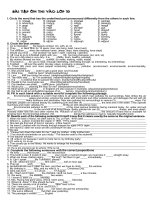
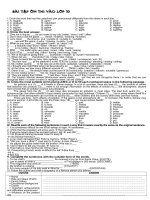
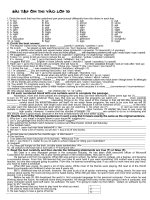
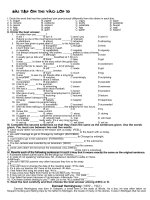
![De & DA thi thu vao lop 10 Tieng Anh dot 1[2]](https://media.store123doc.com/images/document/13/ve/jm/medium_jmt1377389770.jpg)

